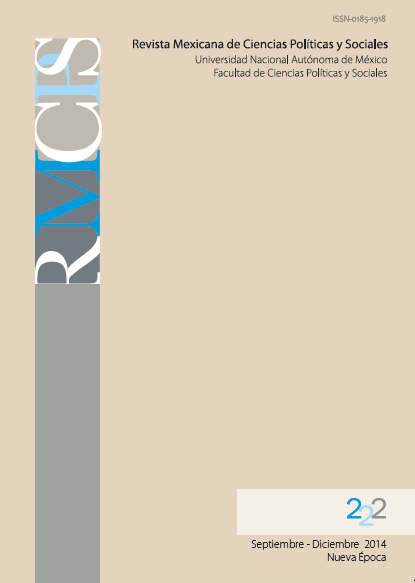Between Technocratic Rationality and Governance The Importance of Political Consensus in Mexico
Main Article Content
Abstract
Downloads
Article Details
Citas en Dimensions Service
References
Babb, Sarah, (2001) Managing Mexico. Economists from Nationalism to Neoliberalism. New Jersey, Princeton University Press.
Beausang, Francesca, (2002), Democratizing Global Governance: The Challenges of the World Social Forum. UNESCO, Management of Social Transformations, Discussion Paper núm. 59.
Berger, Suzanne (ed.), (1981) Organizing Interests in Western Europe: Pluralism, Corporatism, and the Transformation of Politics. Cambridge, Cambridge University Press.
Bizberg, Ilán, (2003) “Auge y decadencia del corporativismo” en Bizberg, Ilán y Lorenzo Meyer (comps.) Una historia contemporánea de México. México, Océano.
Cárdenas, Enrique, (1996) La política económica en México, 1950-1994. México, El Colegio de México-Fondo de Cultura Económica.
Crepaz, Markus, (1992) “Corporatism in Decline?” en Comparative Political Studies. Núm. 2, julio.
Dornbusch, Rudiger y Sebastian Edwards (eds.), (1991) The Macroeconomics of Populism in Latin America. Chigaco, University of Chicago Press.
Fisher, Frank, (1990) Technocracy and the Politics of Expertise. Newbury Park. Sage.
Gil Díaz, Francisco, (1984) “Mexico´s Path from Stability to Inflation” en Arnold C. Harberger (ed.), World Economic Growth. San Francisco, Institute for Contemporary Studies.
Hernández Rodríguez, Rogelio, (1992) “La división de la élite política mexicana” en México: auge, crisis y ajuste. Lecturas del Trimestre Económico. Núm. 73, Fondo de Cultura Económica.
Hernández Rodríguez, Rogelio, (1998) “The Partido Revolucionario Institucional" en Mónica Serrano (ed.), Governing Mexico: Political Parties and Elections. Londres, ILAS, University of London.
Hernández Rodríguez, Rogelio, (2011) “¿Aprende a gobernar la oposición? Los gabinetes presidenciales del PAN (2000-2010)” en Foro Internacional. Núm. 203, enero-marzo.
INEGI, (2013-2014) Información anual y trimestral.
Lembruch, Gerhard, (1977) “Liberal Corporatism and Party Government” en Comparative Political Studies. Núm. 1, abril.
Lembruch, Gerhard, (1988) “Concertation and the Structure of Corporatist Networks” en Goldthorpe, John (ed.), Order and Conflict in Contemporary Capitalism. Oxford, Claredon Paperbacks.
Lehmbruch, Gerhard, (1993) “Consociational Democracy and Corporatism in Switzerland” en Publius. Núm. 2, primavera.
Lehmbruch, Gerhard y Philippe C. Schmitter (eds.), (1982) Patterns of Corporatist Policy-Making. Londres, Sage.
Lijphart, Arend y Markus M. L. Crepaz, (1991) “Corporatism and Consensus Democracy in Eighteen Countries: Conceptual and Empirical Linkages” en British Journal of Political Science. Núm. 2, abril.
Nelson, Joan (ed.), (1990) Economic Crisis and Policy Choice. The Politics of Adjustment in the Third World. New Jersey, Princeton University Press.
Merino, Mauricio, (2003) La transición votada. México, Fondo de Cultura Económica.
Nelson, Joan (ed.), (1994) Intricate Links: Democratization and Market Reforms in Latin America and Eastern Europe. Washington, Transaction Publishers.
Oxhorn, Philip y Pamela K. Starr (eds.), (1999) Markets and Democracy in Latin America. Conflict or Convergence? Boulder, Col., Lynne Rienner Publishers.
Rousseau, Isabelle, (2001) México, ¿Una revolución silenciosa? México, El Colegio de México.
Schmitter, Philippe C., (1974) “Still the Century of Corporativism?” en The Review of Politics. Núm. 1, enero.
Schmitter, Philippe C. y Gerhard Lehmbruch (eds.), (1979) Trends toward Corporatist Intermediation. California, Beverly Hills, Sage.
SHCP, (2013-2014) Información anual y trimestral.
Villarreal, René, (1976) El desequilibrio externo en la industrialización de México, 1929-1975. México, Fondo de Cultura Económica.

La Revista Mexicana de Ciencias Políticas y Sociales publicada por la Universidad Nacional Autónoma de México se distribuye bajo una Licencia Creative Commons Atribución-NoComercial-SinDerivar 4.0 Internacional.
Basada en una obra en http://www.revistas.unam.mx/index.php/rmcpys/
La RMCPyS autoriza a sus colaboradores que suban una copia de sus trabajos publicados en sus webs personales o en cualquier repositorio de acceso abierto, siempre y cuando se mencione específicamente a la Revista Mexicana de Ciencias Políticas y Sociales como fuente original de procedencia, citando el año y número del ejemplar respectivo y añadiendo el enlace a la página web donde este órgano editorial puede ser consultado in toto, de manera abierta y gratuita en: <www.revistas.unam.mx/index.php/rmcpys>.
Las y los lectores tienen libertad para:
Compartir, copiar y redistribuir el material en cualquier medio o formato.
El licenciante no puede revocar estas libertades en tanto usted siga los términos de la licencia.
De acuerdo con los siguientes términos:
- Atribución: la/el lector/a debe reconocer el crédito de una obra de manera adecuada, proporcionar un enlace a la licencia, e indicar si se han realizado cambios. Puede hacerlo en cualquier forma razonable, pero no de forma tal que sugiera que tiene el apoyo del licenciante o lo recibe por el uso que hace.
- No comercial: la/el lector/a no puede hacer uso del material con fines comerciales.
- Si se mezcla, transforma o se desarrolla a partir de la obra licenciada, no se permite la distribución del material modificado.
Cargos por gestión de artículos
La Revista Mexicana de Ciencias Políticas y Sociales NO cobra tarifas por recibir, procesar o publicar los artículos (Article Processing Charge [APC]) enviados por los autores.

